Updated: December 22, 2023
In any business, two-thirds depend on a reason, one-third on a chance. Increase the first fraction, and you are faint-hearted. Increase the second, and you are foolhardy. In this article, we will talk about the connections between mathematics and casino and how they are always winning and do they lie on luck.





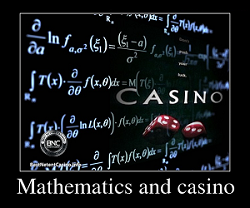 You need to know that most casino games were developed by Mathematics, so do not be surprised if you realize that not everything is luck in gambling. Can we use their calculations to get an advantage over the casino? Read the article further and answer yourself.
You need to know that most casino games were developed by Mathematics, so do not be surprised if you realize that not everything is luck in gambling. Can we use their calculations to get an advantage over the casino? Read the article further and answer yourself.
Also, we will talk about adaptive casino mathematics at Canadian online casinos. Perhaps you don’t know, but the motto of NetEnt is “equal chances for all our players.” However, another factor that you might not know is that gambling websites (licensed ones) cannot control any casino game settings (RTP, winnings, losing, etc.).
The provider configures all this, and the gambling site is just renting the slots to provide them to the players. Ok, but there should be a difference between a player who is depositing 10 000CAD for the 10th time and never withdrawals the money and a player who is depositing 10 000CAD and withdrawing the money after winning 1000CAD. For that exact reason, adaptive mathematics is used, so believe us, the casino slot’s behaviour will be different for those two players.
As we all know, the main target of online casinos is to attract as many punters as they can, so in the future, all of them will lose a lot of money. This is a fact, but if all players were losing, there wouldn’t be any players in the end. Now we are coming to the gambling site game software; its “job” is to make people believe in their big winnings, which gets them depositing again and again.
In 1526 Italian mathematician Geralomo Cardano was the first one who wrote about mathematics at the dice game in his book “Book on Games of Chance.” After a lot of time spent in practice, he tried to make bet management recommendations based on his experience:
“Probability theory is concerned with determining the relationship between sometimes when some specific given event occurs, and several times an event occurs.”
Later, from the end of the 16th — to the beginning of the 17th century, Galileo Galilei and Blaise Pascal continued the same mathematical analyses for the dice game. A friend of then (a big gambler) asks them to help him. You need to know that the theory of probability grew because of the gambling problems of a player.
It is commonly believed that at that time, a whole new branch of mathematics was born, wholly dedicated to probabilities. The next step in this direction was made by Dutch mathematician Christiaan Huygens, who published a book in the middle of the 17th century, “On Reasoning in Games of Chance” (“De Ratiociniis in Ludo Aleae”).
After that, the further development of the probability theory was done in the writings of many great mathematicians of the 18th-19th century – Jacob Bernoulli, Poisson, Laplace, Moivre and others. Very soon, a new theory became widely used in spheres that are entirely different from gambling.
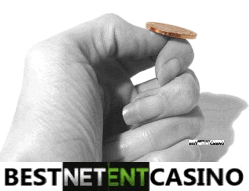 How do the probability and gambling theories work? First, let’s try to find out if there is a connection between mathematics and gambling. At a coin toss, any of its sides have the same likelihood of dropping. So, we have one of two outcomes – heads or tails. The probability of getting heads is ½ (50%), so half of the tosses will be heads.
How do the probability and gambling theories work? First, let’s try to find out if there is a connection between mathematics and gambling. At a coin toss, any of its sides have the same likelihood of dropping. So, we have one of two outcomes – heads or tails. The probability of getting heads is ½ (50%), so half of the tosses will be heads.
The probability is how often an expected outcome may happen. It is represented as a ratio of expected outcomes to the total possible outcomes at many retries within an extended period.
The likelihood of an outcome reflects the quantitative possibility of that outcome. If it is equal to zero, that outcome may not happen at all. If it is equal to 1 (100%) – the outcome will happen.
A standard deck has 52 cards, including 4 ACEs. The probability of getting an ACE is: (4 / 52) * 100 = 7,69%. European roulette has 37 cells on the wheel: 1-36 – numbers (18 reds and 18 blacks), and zero is coloured green.
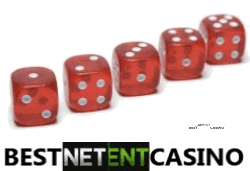 If we are talking about win/loss ratio and mathematical expectations, the first thought is connected with the casino, so let’s try to explain it:
If we are talking about win/loss ratio and mathematical expectations, the first thought is connected with the casino, so let’s try to explain it:
If the likelihood of an event outcome does not affect the probability of another, these events are called independent. For example, let us toss the coin twice. The second outcome does not depend on the first one. Therefore, both of these events do not affect each other, so they are independent.
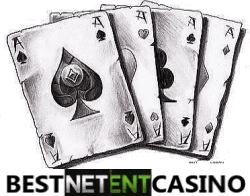 Let us assume we get three ACEs from the card deck. The chance of getting an ACE first is 4 to 52. If the first card is ACE, then we have 3 ACEs remaining, and the number of cards in the deck now is 51. In this case, the probability of getting another ACE is 3 to 51 — the same for the third ACE – 2 to 50 (50 cards, 2 ACEs in the deck).
Let us assume we get three ACEs from the card deck. The chance of getting an ACE first is 4 to 52. If the first card is ACE, then we have 3 ACEs remaining, and the number of cards in the deck now is 51. In this case, the probability of getting another ACE is 3 to 51 — the same for the third ACE – 2 to 50 (50 cards, 2 ACEs in the deck).
One of the simplest things for the players in gambling is the mathematical expectation (expected value). Of course, all the described examples are very confusing for the normal brain, but for the gambler’s mind, it is all about money; that’s why they understand the examples much more comfortable because they connect numbers with money.
МО = (the number of positive outcomes [wins] / the number of possible outcomes) * the amount of the winning + (the number of negative outcomes [losses] / the number of possible outcomes) * the bet amount. Many of you will see this as a Chinese inscription, but it is quite simple.
Your bet is 1 CAD on hearts to be the first card. According to the probability theory, a positive outcome (you get the hearts, and you win +1 CAD) will happen with a likelihood of a ¼, negative outcome (you get another suit, and you lose 1 CAD) will happen with a probability of ¾.
Let us calculate the mathematical expectation using the above formula: МО = 1/4 * (1CAD) + 3/4 * (-1CAD) = – ½CAD
Thus, your loss will be 50 cents for every dollar bet within a long period, so, according to the casino mathematics, 4 spins will make you lose three times, 1CAD each (you get a loss of 3CAD) win a single time – 1CAD.
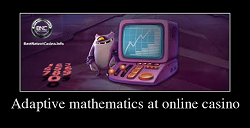 Mathematical laws with several variables determine the likelihood of a huge winning. These variables can be adaptive.
Mathematical laws with several variables determine the likelihood of a huge winning. These variables can be adaptive.
That is correct, but let’s explain it more simply. Adaptive math is a factor that aligns with the player’s interests and does not discourage him from the game but rather motivates him to make deposits over and over again.
According to the NetEnt players’ classification, there is a direct connection between the player’s history (positive or negative) and the possibility of hitting the big win.
Adaptive math is an adjusting model. This means it will do the necessary (give winnings out or not) according to the declared RTP of the casino game. Thus, the more spins we make, the closer we are to the RTP (return to player percentage). Check the following example:
In mathematics, dispersion is a statistical measure that tells you how measured data vary from the average value of the set data. In our case, it is a risk degree. Being used in gambling, dispersion is the deviation degree of the outcome from its mathematical expectation. The dispersion makes the game unpredictable; you either win or lose.
The gambling houses exist thanks to dispersion: any result would be calculated mathematically. The dispersion is neither a positive nor negative factor, and it exists by itself as an objective reality. To some extent, it compensates for negative mathematical expectations, allowing the player to win (at a short distance). At the same time, it is impossible to create a successful strategy for winning in the long term.
It should be noted that when betting on “colour,” the dispersion in roulette is almost absent. In practice, however, there are records of 15 straight droppings of the same colour.
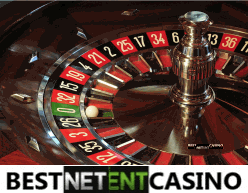 Let us calculate the mathematical expectation at roulette (American one with two zero sectors: zero and double zero) when bet 1 CAD on colour (black): 18/38 * (+1 CAD) + 20/38 * (-1 CAD) = -2/38 = -0.0526 (or -5.26%).
Let us calculate the mathematical expectation at roulette (American one with two zero sectors: zero and double zero) when bet 1 CAD on colour (black): 18/38 * (+1 CAD) + 20/38 * (-1 CAD) = -2/38 = -0.0526 (or -5.26%).
As you have probably noticed, in both given examples, the value of mathematical expectation has a “-” (minus), which is typical of most gambling website wagers. Negative mathematical expectation means the longer the game, the higher the probability of loss.
Casino advantage (House Edge) [house percentage] (RTP) is the value that is opposite to the mathematical expectation of the gambler; it is the casino advantage (percentage) over the player.
The casino advantage in European roulette is 1 – 36/37 = 2,7%, in American – 1 – 36/38 = 5,26% (thanks to two zero sectors). This means that if you bet 1000 CAD, the likelihood of losing 27 CAD (in European roulette) and 54 CAD (in American roulette) is quite high. At table games, the casino advantage is lower (Baccarat, Blackjack or Craps).
Let us take American roulette again, which has 36 numbers and 2 zero sectors. Suppose we bet on a number. In this case, the probability of a win is 1 to 36:
 If the probability of events is identical, it does not mean that we will get such an outcome from now on. For example, suppose we toss ten coins at the same time. Then, it is logical to expect 50% of tails. However, the likelihood of getting 60% or above is quite high. This is thanks to the dispersion we talked about earlier.
If the probability of events is identical, it does not mean that we will get such an outcome from now on. For example, suppose we toss ten coins at the same time. Then, it is logical to expect 50% of tails. However, the likelihood of getting 60% or above is quite high. This is thanks to the dispersion we talked about earlier.
By tossing a coin ten thousand times, we get a balanced expected value (50%). The probability of getting 60% or a larger number of tails at a random toss of 10 coins = 0,377. Let us get the same for one hundred coins.
The probability of getting 60% of tails is equal to 0,028, or approx. 1 out of 35. If tossing 1000 coins, to get 60% or a larger number of tails is quite impossible. The likelihood of this event equals 0.000000000136 (less than 1 out of 7 billion). We will not get the 50% of tails, but the more coins we have, the closer we are to the average value (50%).
That is how the “law of large numbers” works: the accuracy of the expected outcome ratio (according to the probability theory) is higher when we have a larger number of events. By using this law, you may accurately predict only the outcome of a series of similar events. Although the outcome of each event is unpredictable, it is balanced at a long distance.
On our site, we have a list of strategies and recommendations that can be used to get positive mathematical expectations. It is based solely on mathematical calculations, considering the payout percentage of each of the slots and the betting requirements of the bonuses.

Playing at a Canadian online casino is very easy; you don’t have to be very good at mathematics. You don’t even need to try to calculate the mathematical expectation or dispersion; it was done a long time ago. However, you need to realize that the gambling website games that can bring you a positive mathematical expectation need to be your first choice when starting your gaming session.
For example, play at European roulette (with a single zero sector), here the casino advantage is 2,7% when in American roulette (with two zero sectors), it is 5,26%. Do not forget to find a game according to your playing style.
If you are looking for a game without risking too much, find games with lower dispersion; higher dispersion games can increase stress. Remember that mathematics in casinos can be calculated for the long term and can happen everything in a short period.